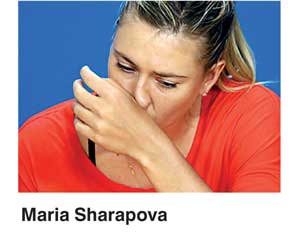Thursday Feb 19, 2026
Thursday Feb 19, 2026
Friday, 10 June 2016 00:23 - - {{hitsCtrl.values.hits}}
Reuters: The career of Russian former world number one Maria Sharapova was in tatters on Wednesday after she was given a two-year ban by the International Tennis Federation (ITF) following her positive test for the banned drug meldonium.
In a statement the ITF said the five-times grand slam champion's ban would be backdated to Jan. 26 this year, meaning her results and prize money from the Australian Open, where she reached the quarter-finals, would be cancelled out.
Sharapova, 29, said she would appeal to the Court of Arbitration for Sport (CAS), describing the punishment as "unfairly harsh".
She said an independent tribunal in London on May 18-19 had found that she had not intentionally violated anti-doping rules.
A 33-page report of the tribunal's findings said: "The ITF accepts that the player did not engage in conduct that she knew constituted an antidoping rule violation," but it rejected her assertion that there was no "significant" fault on her part.
"She was the sole author of her own misfortune," it said.
On its website, the ITF said the ban, which could have been as long as four years, had been backdated due to Sharapova's "prompt admission" of taking the substance, and would end on midnight of Jan. 25, 2018.
The World Anti-Doping Agency (WADA) later issued a short statement saying it would review the decision before deciding whether to use its independent right of appeal to CAS.
Sharapova has regularly battled back from serious injuries during her glittering career but the two-year ban means she will not be eligible to play until after the 2018 Australian Open when she will be 30, and raises the question of whether she will ever play again.
"If it stands, then I think it will be difficult for her to come back at the same level," the president of the Russian Tennis Federation, ShamilTarpishchev, told TASS news agency, calling for the penalty to be reduced.
Time and resources
Meldonium was added to WADA's list of banned substances at the start of the year after mounting evidence that it boosted blood flow and enhanced athletic performance.
Around 180 athletes have tested positive for the drug, manufactured in Latvia and common throughout eastern Europe, since January.
Sharapova, the world's highest-paid female athlete, stunned the sporting world in March when she announced that she had tested positive for meldonium, a component of a product named Mildronate which she has taken since 2006 for health issues.At the time Sharapova, the highest-profile tennis player to fail an anti-doping test, said she had made "a huge mistake" in failing to realise that continuing to take Mildronate would be a violation of the anti-doping code.
"The ITF spent tremendous amounts of time and resources trying to prove I intentionally violated the anti-doping rules and the tribunal concluded I did not," she said on Facebook.
The ITF had sought a four-year suspension but the tribunal rejected that, she said.
"While the tribunal concluded correctly that I did not intentionally violate the anti-doping rules, I cannot accept an unfairly harsh two-year suspension."
The tribunal found that Sharapova had taken Mildronate before each of her five matches at this year's Australian Open where she lost to Serena Williams.
It rejected Sharapova's argument that the ITF should have informed her that she and a number of other tennis players had tested positive for meldonium in 2015 before it was added to the banned list.
"Concealed"
The report also said that Sharapova had not made her use of Mildronate known to most of her team, including her coach, her trainer, her physiotherapist and her nutritionist, nor any of the doctors made available to players by the WTA.
Questioning why she continued taking Mildronate before matches, the report said: "In the tribunal's view the answer is clear. Whatever the position may have been in 2006, there was in 2016 no diagnosis and no therapeutic advice supporting the continuing use of Mildronate.
"If she had not concealed her use of Mildronate from the anti-doping authorities, members of her own support team and the doctors whom she consulted, but had sought advice, then the contravention would have been avoided," it said.
The ban will have an enormous impact on Sharapova's earning potential. Swiss watchmaker TAG Heuer cut its ties with Sharapova after the news of her doping violation while other sponsors such as Porsche distanced themselves from her.
Nike however, said on Wednesday they would continue to work with Sharapova.
“The ITF Tribunal has found that Maria did not intentionally break its rules," the sports apparel giant said in a statement. "Maria has always made her position clear, has apologised for her mistake and is now appealing the length of the ban."
Sharapova has 35 WTA singles titles and has won all four of the sport's grand slam titles.
Her career earnings amount to $36 million while her off-court earnings, according to Forbes, are around $200 million.